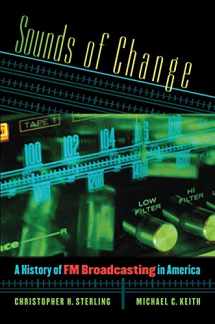
Sounds of Change: A History of FM Broadcasting in America
ISBN-13:
9780807832158
ISBN-10:
0807832154
Edition:
New edition
Author:
Michael C. Keith, Christopher H. Sterling
Publication date:
2008
Publisher:
The University of North Carolina Press
Format:
Hardcover
336 pages
FREE US shipping
Book details
ISBN-13:
9780807832158
ISBN-10:
0807832154
Edition:
New edition
Author:
Michael C. Keith, Christopher H. Sterling
Publication date:
2008
Publisher:
The University of North Carolina Press
Format:
Hardcover
336 pages
Summary
Sounds of Change: A History of FM Broadcasting in America (ISBN-13: 9780807832158 and ISBN-10: 0807832154), written by authors
Michael C. Keith, Christopher H. Sterling, was published by The University of North Carolina Press in 2008.
With an overall rating of 3.6 stars, it's a notable title among other
Media & Communications
(Industries, Communications, Business Skills, Communication & Media Studies, Social Sciences) books. You can easily purchase or rent Sounds of Change: A History of FM Broadcasting in America (Hardcover) from BooksRun,
along with many other new and used
Media & Communications
books
and textbooks.
And, if you're looking to sell your copy, our current buyback offer is $0.39.
Description
When it first appeared in the 1930s, FM radio was a technological marvel, providing better sound and nearly eliminating the static that plagued AM stations. It took another forty years, however, for FM's popularity to surpass that of AM. In Sounds of Change, Christopher Sterling and Michael Keith detail the history of FM, from its inception to its dominance (for now, at least) of the airwaves.Initially, FM's identity as a separate service was stifled, since most FM outlets were AM-owned and simply simulcast AM programming and advertising. A wartime hiatus followed by the rise of television precipitated the failure of hundreds of FM stations. As Sterling and Keith explain, the 1960s brought FCC regulations allowing stereo transmission and requiring FM programs to differ from those broadcast on co-owned AM stations. Forced nonduplication led some FM stations to branch out into experimental programming, which attracted the counterculture movement, minority groups, and noncommerc


We would LOVE it if you could help us and other readers by reviewing the book
Book review

Congratulations! We have received your book review.
{user}
{createdAt}
by {truncated_author}


